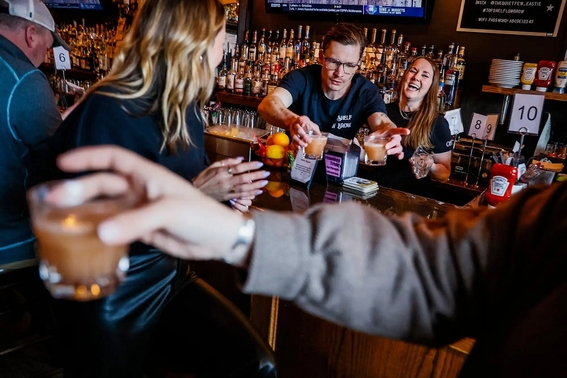 Bartenders at The Quiet Few in East Boston mix drinks behind the bar on a Wednesday night. |
BOSTON HAS a liquor license problem. I have a solution.
The problem is an old one: Under rules that have been in place since Prohibition ended in 1933, the state limits the City of Boston to approximately 1,200 licenses to serve alcohol. That is far too few for a city with 700,000 residents and tens of millions of annual visitors, so the demand for liquor licenses long ago outstripped the supply. With the city's hands tied by state law, the only way to obtain a license to pour is to buy one from an existing owner on the secondary market.
As the shortage of licenses has grown steadily more acute, their market value has grown more extortionate. The prevailing price in Boston for a license, typically purchased from an establishment going out of business, is now $600,000. For most aspiring restaurateurs, who operate on paper-thin margins, that is unaffordable. Yet without a liquor license, many restaurants simply cannot survive. As a result, the only entrepreneurs able to open venues in Boston where customers can order beer, wine, or spirits tend to be those with very deep pockets, such as national chains, large hotels, or restaurants backed by wealthy investors. For everyone else, the only options are to go heavily into debt to finance a license or, as the Globe's Diti Kohli reported last month, to give up on Boston and launch their restaurant in a suburb or another city.
It's a system rooted in bigotry. With the repeal of Prohibition, the Yankee-dominated Legislature didn't trust Boston's Irish politicians to regulate the city's bars and restaurants, and imposed a stringent cap on the number of establishments where alcohol could be served. In the decades since, the artificial scarcity induced by the Legislature has become notorious, yet Beacon Hill will not relinquish its authority. In 2006 and 2014, it grudgingly authorized the creation of a few dozen additional licenses, most under a "restricted" status allowing them to be used only in specific neighborhoods and prohibited from being transferred to a subsequent owner.
Now, under pressure from Boston officials, and following extensive coverage by the Globe, the House of Representatives has agreed to a little more tinkering around the edges. A bill approved Thursday would authorize 205 new liquor licenses — but only under numerous conditions, restrictions, and stipulations. Of the new licenses, which would be doled out over three years, 180 would be earmarked for 12 "underserved" areas, many under a limitation requiring them to eventually be returned to the city. Three more would be earmarked for Brighton's Oak Square and 15 would be set aside for nonprofits. A total of just seven liquor licenses would be unrestricted, free to be used anywhere in Boston and sold to a subsequent owner.
All in all, the new scheme (which still needs Senate approval) would make only a dent in the shortage. Most would-be restaurateurs — especially those interested in Boston's most tourist-friendly precincts, such as Back Bay and the Seaport — would still have to pony up hundreds of thousands of dollars just for permission to open a place where they could serve drinks. That might suit existing owners, who don't want the value of their licenses reduced through competition. But it will only perpetuate the harm to those penalized by the present system — aspiring business owners, hospitality workers, consumers, visitors, and the city itself.
I propose a better solution.
After 90 years of micromanaging and limiting access to liquor licenses in New England's largest city, it's time the Legislature allowed the market to operate freely. Is there a way to do so that would maximize opportunity for entrepreneurs while significantly protecting the interests of current license holders? Yes — clone every liquor license in Boston into two liquor licenses, freely transferable and unrestricted.
By that means, every owner of a license in Boston would become the owner of a second license, which could be disposed of as the owner wished. It could be used to open another restaurant or bar, sold to a new owner, donated as a gift, or retained for future use. The market value of liquor licenses would quickly descend from the stratosphere. But existing licensees would be compensated by the doubling of their holding.
Ideally, the government should play no role at all in setting the number of liquor licenses. Its function should be limited to establishing minimum requirements for operating a food or beverage business, then licensing anyone who meets those requirements. In the meantime, at least, the Legislature ought to fix the shortage for which it is responsible. Pass a law to clone every Boston liquor license, then get out of the way and let the market work its magic.
Jeff Jacoby is a columnist for The Boston Globe.
-- ## --
Follow Jeff Jacoby on X (aka Twitter).
Discuss his columns on Facebook.
Want to read more? Sign up for "Arguable," Jeff Jacoby's free weekly email newsletter.

